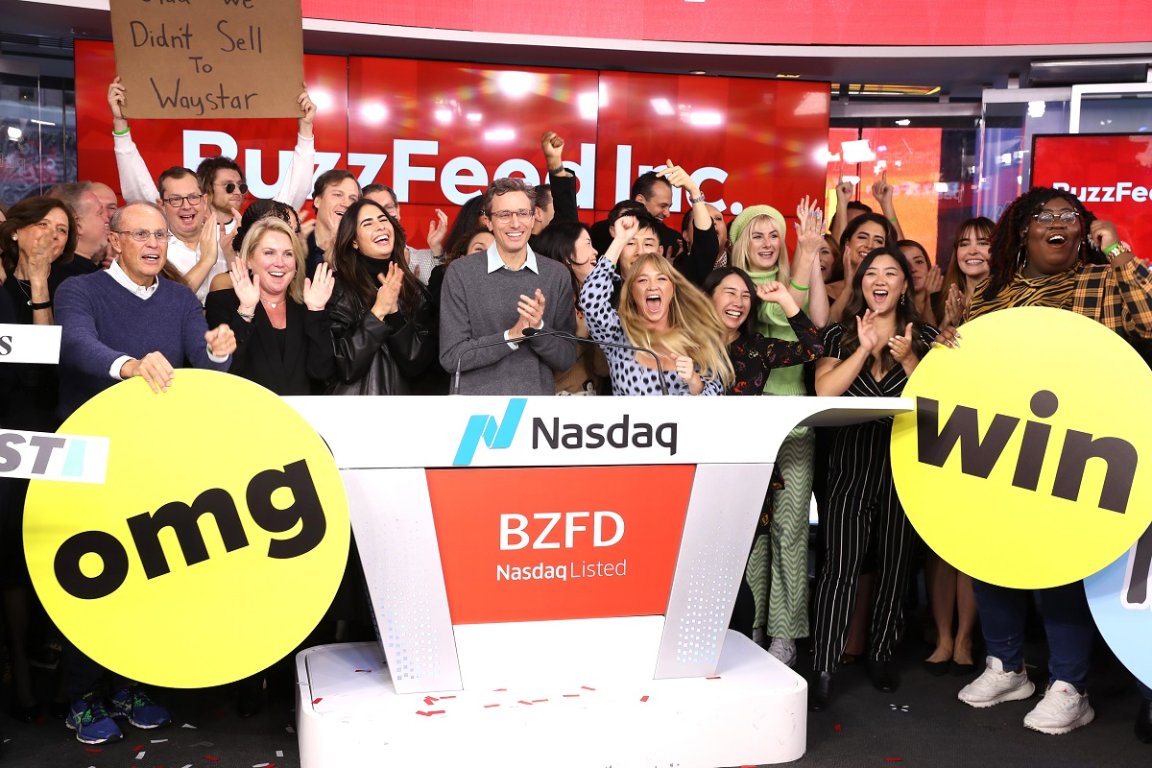
The ur-viral content site BuzzFeed has often served as a trailblazer — and sometimes a canary in the coal mine — for the digital media industry. Now, its struggle to succeed after a pivot to artificial intelligence could signal tough times ahead for publishers that choose a similar path.
The media company’s stock has been sliding ever since it went public in 2021, but as it dipped below a dollar per share around the beginning of this year, CEO Jonah Peretti announced an apparent Hail Mary: AI.
Peretti explained in a memo to employees that the media company’s namesake platform would begin to dip its toes in AI waters with so-called “Infinity Quizzes,” or AI-integrated riffs on the site’s famous “What Kind of Bread Would You Be If You Were Also a Katy Perry Song?”-type quizzes. His hope, he said at the time, was to usher in a “new model for digital media that is more personalized, more creative, more dynamic — where really talented people who work at our company are able to use AI together and entertain and personalize more than you could ever do without AI.”
At first, investors were clearly thrilled by the notion of AI integration, with BuzzFeed‘s stock tripling in value to nearly $4 per share.
Despite that initial enthusiasm, however, reality soon dampened the concept. A few months later, we noticed that BuzzFeed wasn’t just publishing quizzes; it was also using AI to quietly churn out repetitive, dull, and overall poorly-written travel guides. In April, it shut down the award-winning BuzzFeed News. And by May, the media company’s per-share stock price had again fallen below the dollar mark.
Peretti has continued to follow the AI carrot nonetheless, predicting during BuzzFeed‘s Investor Day in late May that gamified, interactive, and AI-generated material would soon “replace the majority of static content” across the media landscape. Unlike the CEO’s January memo, that pitch failed to move the market’s needle, and in June, BuzzFeed was hit with a grave warning: it needed to get its stock price back above a dollar by November 27 — now coming up in just a few months — or face removal from the Nasdaq stock exchange entirely.
Now the company’s stock is hovering around just $0.31 a share, a catastrophic decline from the $3.87 it spiked to after Peretti’s initial AI announcement, and even from the one-dollar mark it’d been at before that. If AI is going to dig BuzzFeed out of this hole, it’s clearly got a long way to go.
The timeline of BuzzFeed‘s slow-motion demise — and the failure of its AI promises to resuscitate its fortunes, at least so far — is worth reflecting on. To be clear, BuzzFeed‘s woes certainly didn’t begin with AI; it’s been a tough year across the tech and media landscapes, and headwinds in the industry were blowing long before the AI gold rush kicked off. BuzzFeed‘s share price had been falling ever since it went public, and AI likely had little to do with the fact that the company missed its 2022 revenue predictions by over $2oo million — a fate that it seems on track to repeat in 2023, considering that it just recorded a significant Q2 revenue decline.
But while AI may not be the root of BuzzFeed‘s core problems, it doesn’t seem to have helped, either. It’s been the better part of a year since Peretti’s January memo, and BuzzFeed‘s “creative AI assistant,” dubbed Buzzy the Robot, appears to still only be churning out AI-powered infinity quizzes, mostly in non-English languages. Not all these quizzes are terribly functional — the comments on one recently published “Infinity Quiz” designed to give users meal ideas, for example, is full of complaints that the bot suggested recipes chock-full of the very ingredients that users expressly noted they were allergic to.
Still, Peretti has held the line that users love the AI quizzes, and when we reached out to BuzzFeed for comment, a spokesperson reiterated that claim, saying readers spend an average of three times longer looking at AI-generated content compared to the old-fashioned human-generated stuff. (It’s worth noting that a lot of BuzzFeed’s AI content pretty much makes users spend more time on the page, since they typically have to fill out various text prompts, and then the AI has to generate results, which tends to take about 15-20 seconds. So, that figure might have less to do with quality and more to do with sheer functionality.)
That said, the spokesperson also said BuzzFeed’s AI-generated material rakes in roughly “three times” more traffic than its regular content, although they declined to share more specific metrics about the AI content’s traffic.
In any case, though, that might all be beside the point. For all those claims, BuzzFeed’s stock is dying on the vine. Even if the company’s AI content is significantly outperforming its static material, the heart of the company’s problems, whatever that may be, continues to remain unchanged.
That inability to meaningfully capitalize on generative AI may speak to a broader trend in media. BuzzFeed is just one of several media companies — including G/O Media, CNET-owner Red Ventures, and the local newspaper giant Gannett — to have made major AI pivots amid mass workforce layoffs and restructurings. There’s a distinct lipstick-on-a-pig feeling to it — a desperate last-ditch attempt to slap a bit of shine paint on the brand’s image, rather than a holistic solution to the company’s deeper issues. And in BuzzFeed‘s case, as it stands, AI doesn’t seem to be making the picture much prettier.
More on BuzzFeed: BuzzFeed Is Quietly Publishing Whole AI-Generated Articles, Not Just Quizzes